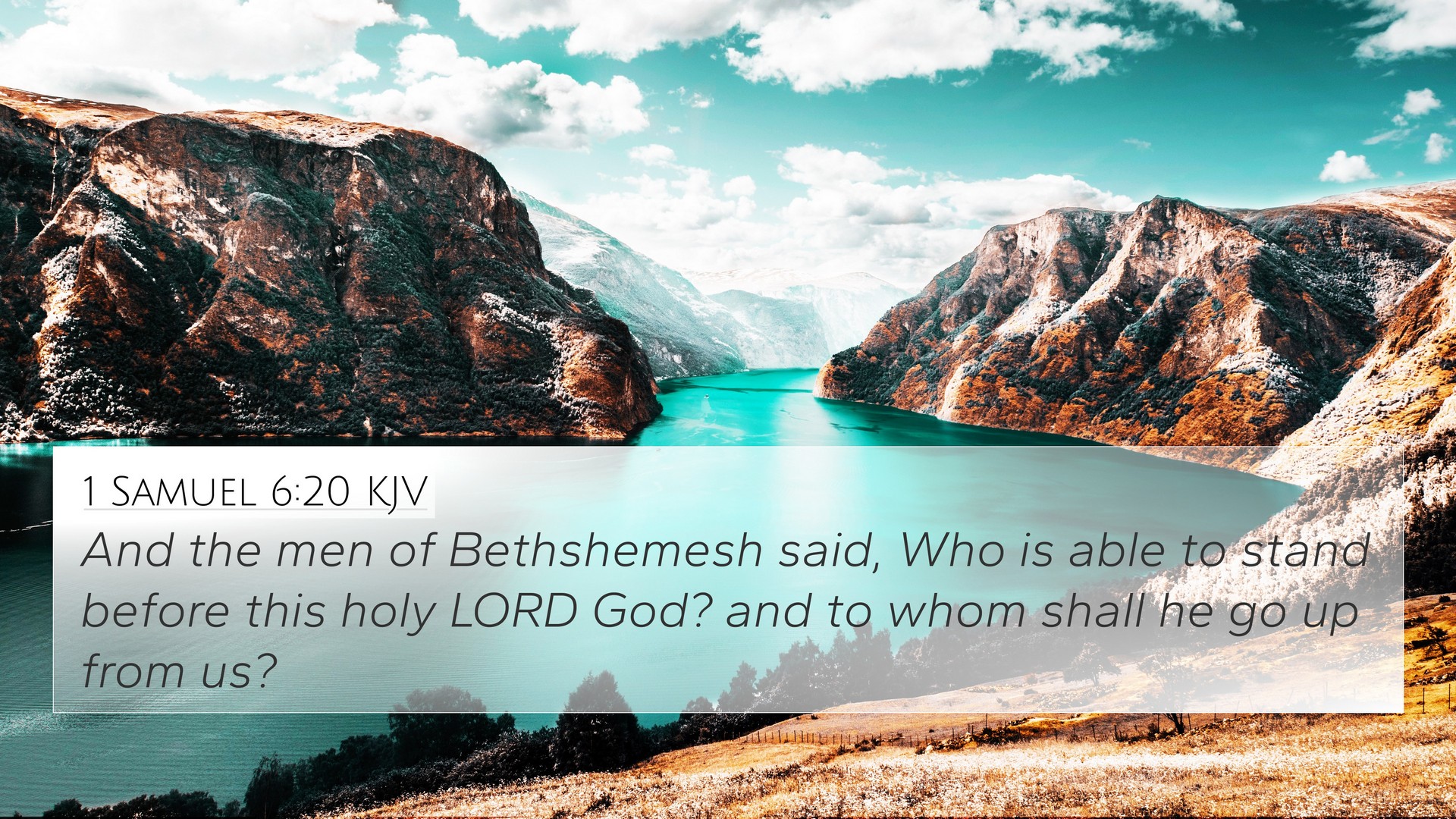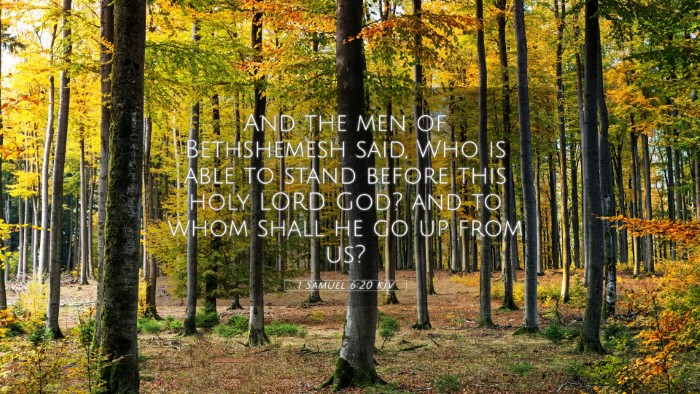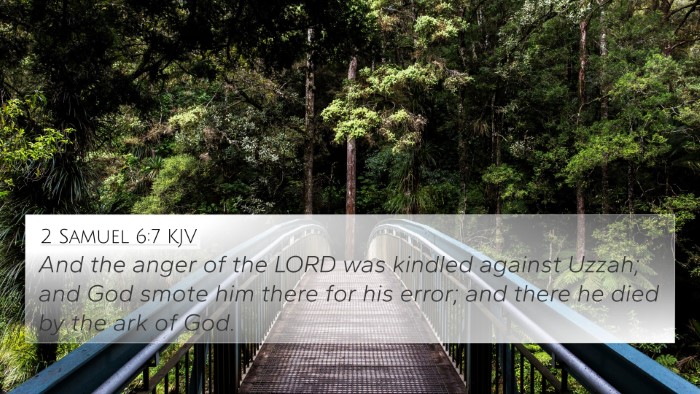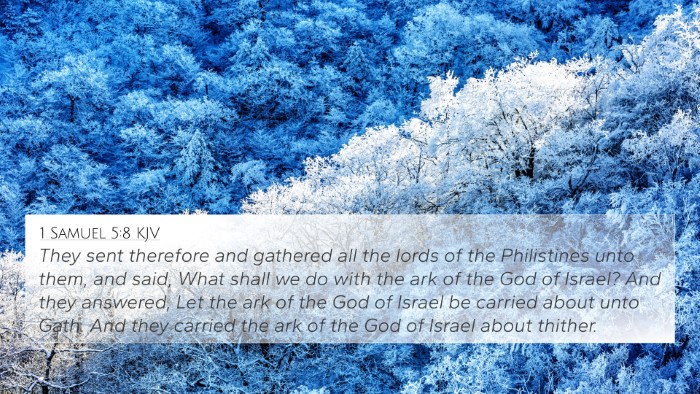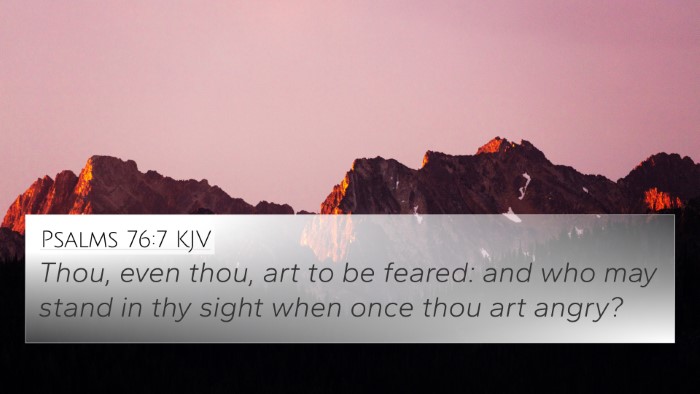Understanding 1 Samuel 6:20
"And the men of Beth Shemesh said, Who is able to stand before this holy Lord God? and to whom shall he go up from us?" - 1 Samuel 6:20
This verse reflects the profound sense of awe and fear that the people of Beth Shemesh experienced in the presence of the Holy God. The return of the Ark of the Covenant brought not only blessing but also a realization of God’s holiness and their own unworthiness.
Interpretation and Commentary
The insights from well-respected public domain commentaries shed light on the meaning of this verse:
- Matthew Henry: He emphasizes that the realization of God's holiness creates a sense of fear in the hearts of humankind. The people recognized that they could not stand before such a divine presence due to their sinfulness. The verse illustrates not only their fear but also the necessity of reverence toward God.
- Albert Barnes: Barnes notes that the rhetorical question posed by the men of Beth Shemesh indicates their understanding of God's majesty. They recognized that no one could confront God without being purified and reconciled. This acknowledgment signifies the moral and spiritual condition of humanity in relation to God’s holiness.
- Adam Clarke: Clarke highlights the theological implications regarding God’s holiness and the need for mediation. He suggests that acknowledgment of one's sin in the face of God leads to the realization that an intercessor is necessary for reconciliation with God.
Theological Reflections
This verse invites deeper reflection on the theme of God's holiness throughout Scripture. It serves as a reminder that approaching God requires humility, acknowledgment of sin, and desire for purification.
Related Bible Verse Cross-References
- Isaiah 33:14: "The sinners in Zion are afraid; fearfulness hath surprised the hypocrites. Who among us shall dwell with the devouring fire? who among us shall dwell with everlasting burnings?"
- Revelation 6:17: "For the great day of his wrath is come; and who shall be able to stand?"
- Exodus 20:19: "And they said unto Moses, Speak thou with us, and we will hear: but let not God speak with us, lest we die."
- Job 9:2: "I know it is of a truth: but how should man be just with God?"
- Micah 6:6-8: "Wherewith shall I come before the Lord, and bow myself before the high God?..."
- Psalms 76:7: "Thou, even thou, art to be feared: and who may stand in thy sight when once thou art angry?"
- Hebrews 12:29: "For our God is a consuming fire."
Connections Between Bible Verses
The connections and themes found in 1 Samuel 6:20 and its related verses showcase a prevalent biblical theme: the fear and reverence due to God. Exploring these connections also provides insights into the character of God and man's standing before Him.
Thematic Bible Verse Connections
As one examines these passages together, the themes of holiness, judgment, and the requirement of mediation emerge starkly. One can discern the unified message across both the Old and New Testaments about humanity's need for a Savior.
Methods for Cross-Referencing Bible Verses
Engaging in cross-referencing can deepen understanding of biblical texts. Employing tools such as concordances or thematic guides allow for the exploration of connections and parallels:
- Bible Concordance: Essential for locating specific verses and their themes.
- Bible Cross-Reference Guide: Provides context and relationships between verses.
- Cross-Reference Bible Study: Methods for exploring biblical connections in depth.
- Bible Reference Resources: Comprehensive materials for thematic study.
- How to use Bible Cross-References: Provides techniques for effective study and understanding.
Conclusion
1 Samuel 6:20 serves as a powerful reminder of God's holiness and the humility required in His presence. The interplay of fear, reverence, and the need for reconciliation resonates throughout Scripture, with numerous cross-references enhancing our comprehension of these vital truths. Engaging in systematic Bible cross-referencing can yield rich insights, enabling scholars, theologians, and laypersons alike to grasp the interconnectedness of God’s Word.
